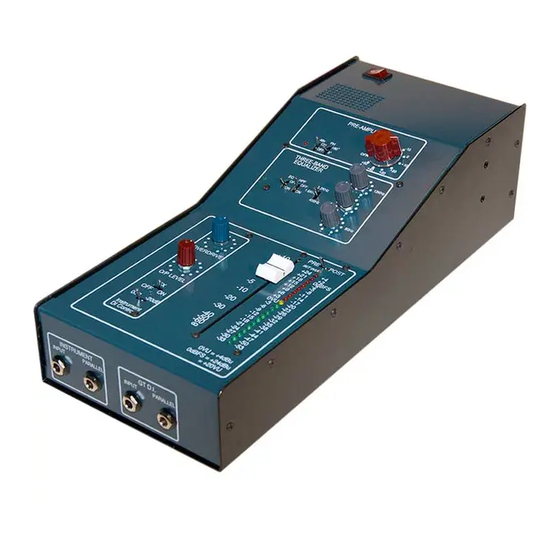
Table of Contents
Advertisement
Quick Links
AURORA AUDIO INTERNATIONAL
1518 North Cahuenga Boulevard
Hollywood, CA 90028
Phone: 323 462 6136 Fax: 323 462 6137
info@auroraaudio.net
Email:
www.auroraaudio.net
Website:
Aurora Audio Stinger Microphone and Instrument Amplifier
Page Index:-
Page 2 – Introduction
Page 3 – Power Supply information
Page 4 – Aurora Stinger Block Diagram
Page 5 – Connecting To The Aurora Stinger
Page 6 – The Regular DI/Mic input and Correct Gain Structure
Page 7 – The Instrument input DI and EQ controls
Page 8 – Equalizer, Phase, and Phantom Power Controls
Page 9 – Using the Aurora Stinger
Page 10 – International dBFS Levels
Page 11– Specifications
Page 12 – Warranty details
1
Advertisement
Table of Contents

Summary of Contents for Aurora Audio Stinger
- Page 1 Page 3 – Power Supply information Page 4 – Aurora Stinger Block Diagram Page 5 – Connecting To The Aurora Stinger Page 6 – The Regular DI/Mic input and Correct Gain Structure Page 7 – The Instrument input DI and EQ controls Page 8 –...
-
Page 2: Introduction
Introduction:- “Congratulations on your purchase of our Stinger! I am confident that you will find that its many features and great Class A discrete vintage sound will help you to make great recordings. The Aurora Stinger is a portable and professional piece of equipment. -
Page 3: Power Supply Information
Power Supply information :- The Aurora Stinger has internal regulated power supplies that automatically adjust to whatever a.c. power source you connect it to. There is no voltage selection switch as the power supplies will automatically work between 80 and 265 volts a.c 50 or 60Hz. - Page 4 Block Diagram :-...
-
Page 5: Connecting To The Aurora Stinger
Connecting to the Aurora Stinger :- The Aurora Stinger has two independent audio paths, both have level controls and XLR balanced and TRS unbalanced outputs. Both balanced outputs have ground lift switches to eliminate ground loops when connecting to external equipment. -
Page 6: The Regular Di/Mic Input And Correct Gain Structure
LEDs are warning you of this issue. The Aurora Stinger output will clip at +26dBu = +22VU and generally well after the A - D converter has gone into very unpleasant sounding clipping. -
Page 7: The Instrument Input Di And Eq Controls
The Instrument input DI and EQ controls :- The left hand front Instrument DI sockets work in conjunction with these controls. If the FX is deselected the path is one megohm input impedance and has +30dB gain to the balanced output XLR. While it is intended for use for bass guitars, with the FX switched off the sound is clean, low distortion, and can also work equally well with regular guitars and most... -
Page 8: Equalizer, Phase, And Phantom Power Controls
Equalizer, Phase, and Phantom Power Controls :- The GT Mic and DI paths both pass through the controls illustrated here. The red bar knob, as discussed on Page 6, controls the gain and the two toggle switches to the left switch on the 48v phantom power for condenser microphones and flip the phase on the balanced XLR... -
Page 9: Using The Aurora Stinger
Using the Aurora Stinger :- The Aurora Stinger has been designed to provide the user with an amazing number of configurations. I have listed several options below. 1. Simultaneous mic preamplifier/EQ with separate guitar accompaniment via the instrument input. 2. Two separate guitar inputs using both DI inputs 3. -
Page 10: International Dbfs Levels
Belgium VRT: 0dB (VRT Ref.) = +6dBu ; -9dBFS = 0dB (VRT Ref.) ; 0dBFS = +15dBu. 0VU on the Aurora Stinger VU meter (the yellow LED) is +4dBu (1.228v ac) and normally -18dBFS on the meters of most digital converters. Any other... - Page 11 Specifications :- Mic / DI Path Gain :- -10dB to +80dB on the input sensitivity switch plus another 10dB in the fader. Input Impedance :- 1.2Kohm (XLR I/P), 10Mohm (DI I/P) Output Impedance :- < 50 ohms balanced VU Meter range :- VU points from -33VU to +24VU in 3dB steps where 0VU = +4dBu = 1.228 vac.
-
Page 12: North Cahuenga Boulevard
Only skilled technicians should repair the Aurora Stinger. Please contact Aurora Audio for technical advice. Aurora Audio is committed to helping you get best use out of the Aurora Stinger. ROHS Directives The RoHS Directive stands for "the restriction of the use of certain...
Need help?
Do you have a question about the Stinger and is the answer not in the manual?
Questions and answers